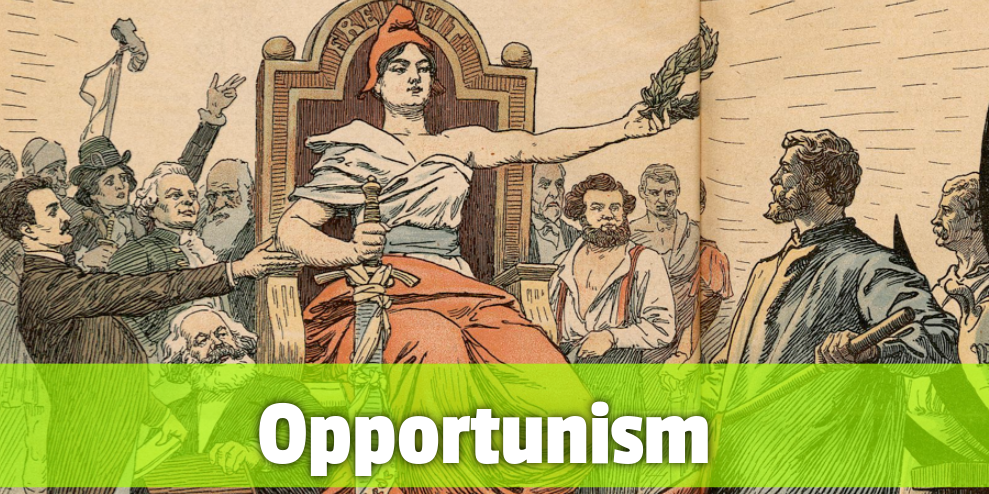Opportunism

A slide within the working class political camp toward positions that, while in their formulation and literalness do not call into question the communist program, in practice weaken it in the name of short-term needs or opportunities, of tactical opportunities, of the difficulty of the program to be understood or of potential contingent advances.
Nature of opportunism
Opportunism is part of the class movement; it should not be mistaken for petty-bourgeois socialism. On the contrary, opportunism is the part of the class movement that expresses the weakness of the proletariat as an exploited class, its permanent difficulties in affirming its own programme, the tendency to fade away, to blur in daily practice the class border with petty-bourgeois socialism and nationalism.
Those who so often consider this word a "simple insult", without trying to reflect on its meaning, are not right. The opportunist does not betray his party, is not disloyal to it, does not withdraw from it. He continues to serve it, sincerely and zealously. But his typical and characteristic feature is that he gives in to the mood of the moment, it is his inability to oppose what is in vogue, it is his political short-sightedness and apathy. Opportunism means sacrificing the long-lasting and essential interests of the Party for the sake of its momentary, transitional and secondary interests. (…)
Where such moods, typical of the intelligentsia, prevail, it is impossible to adopt a firm policy, worthy of the genuinely revolutionary class, that leads resolutely through all the small deviations and hesitations to the preparation of the decisive and self-sacrificing battle against the enemy. This is why the conscious proletariat must know how to maintain a critical attitude toward the intellectuals who pass by its side, it must learn to wage a relentless struggle against opportunism in politics.
Lenin. The Russian Radical Reflects with a Delay!, 1906.
Opportunism is sensitive to political fads, to falling into debates of opinion and false dichotomies fabricated over and over again, especially under state capitalism. Pretending to "be in the world," it paves the way for the loss of class ground, shifting the communist programme towards a future, towards an opportunity that will never come.
The programme is not renounced; all that is done is to postpone its realization... indefinitely. You accept the programme, but this acceptance is not really for yourself, to follow during your life, but only to leave it to your children and grandchildren as an inheritance. And meanwhile, "all the forces and all the energies" are devoted to endless pointless feats and a miserable patchwork of the capitalist regime, to give the impression that something is being done, without at the same time frightening the bourgeoisie.
Marx and Engels. From the circular letter to A. Bebel, W. Liebknecht, W. Bracke and others, 1879
Opportunism empties class action from the inside out, paralyzes the development of consciousness by converting the meaning of communism and its invocation into an empty shell, into a fetish, keeping symbols, terms and flags but calling for action which increasingly becomes indistinguishable from that of petty-bourgeois socialism which will progressively become the great vindicator of state capitalism.
Opportunism in Internationals
Opportunism is a permanent tendency throughout the whole process of class constitution of the proletariat that expresses the weaknesses that the class itself has to overcome.
- During the first phases of rising capitalism, it will manifest itself as a tendency to place itself under the "popular" banners of the petty bourgeoisie. For example, Bakuninism during the Spanish Cantonal Revolution. Under their critique of workers' centralism, the Bakuninists will lead to the dissolution of the class in the exaltation of the national and democratic tasks of the bourgeois revolution, aborting the political affirmation of the workers.
- With the development of the parliamentarianist tactics of the Second International, opportunism will appear, in the first place, as a "relaxation" of the program towards the peasantry (petty bourgeoisie), which will remain in a merely theoretical affirmation, while the future unity of interests of the peasantry -that is, once peasants become proletarians through agricultural concentration- is presented -without openly denying the theory- as an identity of present objectives and interests between workers and peasants.
- With the entry into the imperialist phase of capitalism, especially encouraged by the trade unions, and the errors of the parties of the Second International, opportunism will take shape in a peculiar and intense way that will be crucial through two converging tendencies, reformism and revisionism, which prepare the way for the "sacred union" with the bourgeoisie in the First Imperialist World War, a blatant denial of internationalism and class frontier that could only be affirmed with revolutionary defeatism
- After the first defeats of the revolutionary wave opened up by the Russian revolution in 1917, the Third International adopted the tactic of the "united front". This is the same tactic that the Bolsheviks had used in Russia, and in principle an impeccable technique of producing transitional slogans, but in some sections, such as the French, it slides towards the goal of shoring up the electoral victories of the left to curb the tendency towards an imperialist invasion of Soviet Russia. Parliamentary and trade union opportunism thus paved the way for the International's acceptance of the doctrine of "socialism in one country".
- Within the Fourth International the opportunist tendencies, represented above all by the American SWP, will manifest themselves in the second great imperialist war as a "triumphism" that avoids affirming revolutionary defeatism without denying it. The slide could only end in the surrender of internationalism with the endorsement of recruitment in the "national resistances", the support to the Russian occupiers in the face of workers uprisings and the subsequent call for an electoral "united front" in Western Europe with the same stalinism and social democracy that had led and organized the repression of the insurrectional movements at the end of the war.